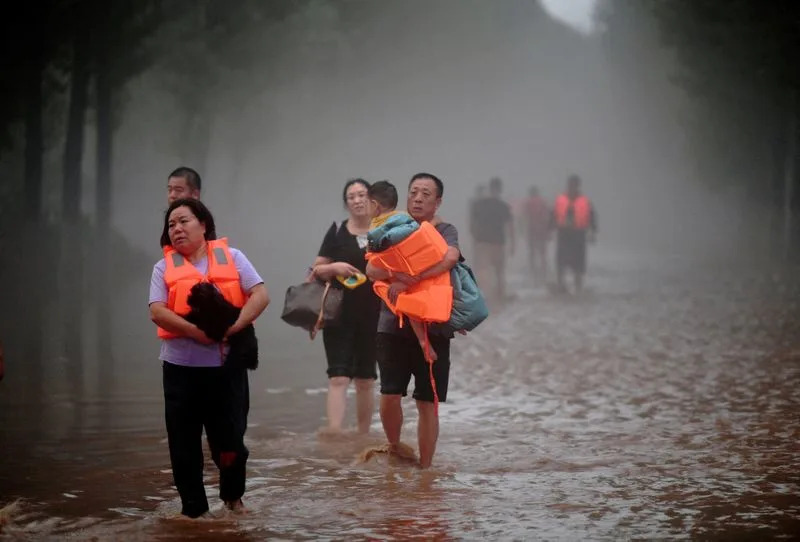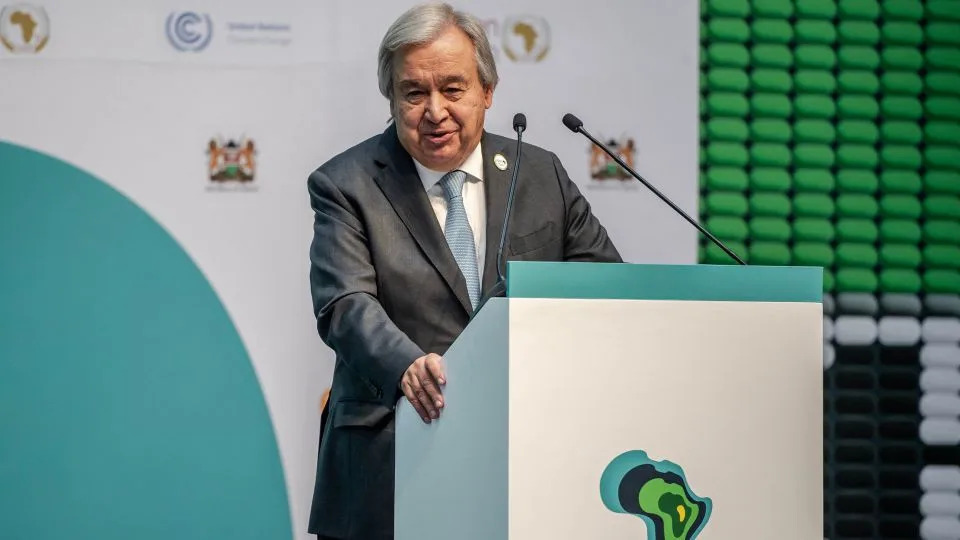Wed, September 6, 2023

FILE PHOTO: Flooding in Zhuozhou
By Kate Abnett
BRUSSELS (Reuters) - Developing countries have proposed that a new U.N. fund unlocks at least $100 billion by 2030 to address irreversible damage caused by climate change, as states prepare to discuss who will benefit and who will pay in at the U.N. COP28 climate summit.
Countries will attempt to hammer out the details of the climate "loss and damage" fund at the summit taking place from Nov. 30 to Dec. 12 in Dubai. If launched, it would be the first U.N. fund dedicated to addressing irreparable damage from climate-fuelled drought, floods and rising sea levels.
While countries agreed to the fund last year, they postponed the most contentious decisions, including which countries will pay into it.
At a United Nations committee meeting last week, developing countries including those in Africa, Latin America, Asia-Pacific and small island states, proposed that the climate damage fund should programme at least $100 billion by 2030.
The published proposal said $100 billion should be a "minimum" and provide a safety net when climate impacts overburden a country's capacity to cope.
"Loss and damage is not just an environmental setback; it's unravelling decades of development efforts," said Madeleine Diouf Sarr, chair of the Least Developed Countries group of 46 nations, which supports the $100 billion proposal.
However, decisions at COP28 need unanimous backing from the nearly 200 countries that attend U.N. climate summits - and the proposal is at odds with the stance of some wealthy nations expected to contribute to the fund.
TOUGH TALKS AHEAD
Diplomats said the U.N. meeting last week did not resolve the most contentious issues around the fund.
Last year's U.N. deal ended years of deadlock over climate damages funding - which the United States and European Union had previously resisted, concerned it could lead to liabilities for countries whose historical emissions fuelled climate change.
But countries are now at odds over which nations should pay into the fund, and which should receive support.
Michai Robertson, who represented the small island developing states' group at last week's U.N. meeting, said all developing nations should be eligible to receive support.
However, small island states - which are among the countries most vulnerable to climate impacts - caveat that this "open to all" approach must also ensure small, highly vulnerable communities are not sidelined by the demands of bigger nations.
The U.N. definition of developed countries that should contribute to climate finance - which dates back to the 1990s - does not include major economies like China and high wealth-per-capita nations like the United Arab Emirates, which is President of this year's UN climate summit.
Wealthy nations want a more targeted fund. A draft of the European Union's negotiating position for COP28, seen by Reuters, said the fund "should focus on developing countries that are particularly vulnerable".
Countries are also split over who should pay.
A United States proposal suggested the fund should attract cash from governments, the private sector, philanthropies and new "innovative sources". A section on which countries should pay was left blank. "There are currently differences of views," the US proposal said.
Looming over the talks is wealthy nations' failure to meet a 2009 pledge to provide $100 billion per year from 2020 in climate finance to poorer nations. That broken promise has fuelled mistrust and resentment among poor nations facing calls to cut their CO2 emissions but struggling raise money to do this.
(Reporting by Kate Abnett; editing by Richard Valdmanis, Alexandra Hudson)
$23 billion pledged at Africa Climate Summit, but leaders warn of need ‘to act with urgency’
Jacopo Prisco, CNN
Thu, September 7, 2023
The inaugural Africa Climate Summit drew to a close on Wednesday, with the host, Kenya’s president William Ruto, saying that a total of $23 billion had been pledged to green projects by governments, investors, development banks and philanthropists.
The summit, which focussed on driving green growth and climate finance solutions, concluded with the “Nairobi Declaration,” a call from African leaders for urgent action on climate change, which included a request for new global taxes on carbon pollution as well as phasing out coal use and ending fossil fuel subsidies.
African heads of state and government warned that many African countries face “disproportionate burdens and risks” from climate change, and called on the global community “to act with urgency” in reducing planet-heating pollution and supporting the continent in addressing the problem.
“Africa is not historically responsible for global warming, but bears the brunt of its effect, impacting lives, livelihoods, and economies,” the leaders said in the joint declaration.
Among the most eye-catching finance announcements, the United Arab Emirates pledged $4.5 billion to clean energy initiatives in Africa. The pledge was announced by Sultan Al-Jaber, the head of the UAE’s national oil company, ADNOC, and the government-owned renewable energy company, Masdar. He will also serve as the president of COP28, the annual UN climate meeting that will take place in Dubai starting in November.
“It is our ambition that this will launch a new transformative partnership to jumpstart a pipeline of bankable clean energy projects in this important continent,” Al-Jaber said, adding that the investment could lead to the generation of 15 gigawatts of clean energy by 2030. Africa’s current clean energy generation capacity is 56 gigawatts.
The initiative marks a positive development, according to Yemi Osinbajo, former vice president of Nigeria and now an advisor for the Global Energy Alliance for People and Planet (GEAPP), a consortium that helps developing countries shift to clean energy.
“It reflects a commitment to addressing the pressing issue of climate change by investing in renewable and sustainable energy solutions in Africa, which is essential for reducing emissions, creating jobs and driving social and economic development,” he told CNN
At the Africa Climate Summit, UN Secretary General Antonio Guterres noted that the continent was responsible for less than four per cent of global carbon emissions. - LUIS TATO/AFP/AFP via Getty Images
Germany announced 450 million euros (about $481 million) of climate finance pledges, and and the US pledged $30 million to support climate resilient food security efforts across Africa. Hundreds of millions more were offered following an initiative to boost Africa’s carbon credit production 19-fold by 2030.
Carbon credits are used by companies to offset carbon emissions, and are usually generated by financing projects that aim to reduce carbon pollution in the atmosphere, such as tree planting, or reduce planet-heating pollution by promoting switching to renewable energy, especially in developing countries.
“Carbon credits could be a game-changer for Africa,” said Osinbajo. “They have the potential to unlock billions for the climate finance needs of African economies while expanding energy access, creating jobs, protecting biodiversity, and driving climate action.”
However, campaigners in Nairobi protested against this approach, arguing that carbon credits are flawed and allow wealthy countries and companies to continue to pollute.
A new framing
In the joint declaration, African leaders called upon the global community “to act with urgency in reducing emissions, fulfilling its obligations, keeping past promises, and supporting the continent in addressing climate change.”
They pointed to steps to achieve this, including accelerating efforts to reduce emissions, honoring the commitment to provide $100 billion in annual climate finance as promised at the 2009 UN Climate Change Conference in Copenhagen, and upholding commitments to “a fair and accelerated process of phasing down coal, and abolishment of all fossil fuel subsidies.”
“Decarbonizing the global economy is also an opportunity to contribute to equality and shared prosperity,” the leaders said.
According to Osinbajo, the summit provided a “new framing” of Africa, not as victim, but as a key solution to the climate crisis. He said that “with its untapped renewable energy potential, the world’s youngest and fastest growing workforce, and critical minerals and resources, (Africa) has the fundamentals to become a cost-competitive green industrial hub, greening both African and global consumption and removing carbon from the air.”

No comments:
Post a Comment